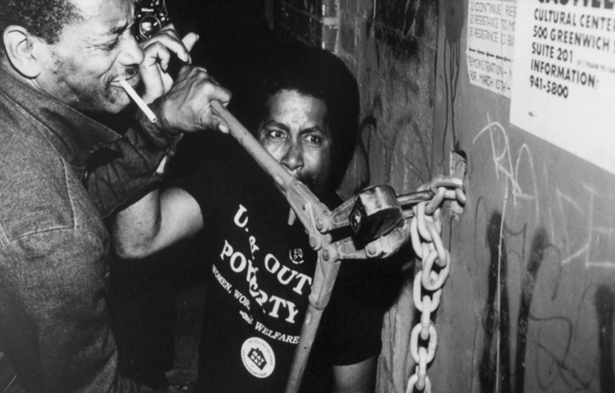As soaring rents force many out of their homes, advocates across the country are battling a slew of state and local measures that criminalize homelessness and imperil those living on the street.
Police in riot gear stormed the chambers of a Los Angeles City Council meeting on Tuesday after one protester climbed a bench to confront Council President Nury Martinez over an ordinance banning homeless encampments near schools and daycares.
Martinez briefly recessed the meeting as dozens of activists chanted “Abolish 41.18!” — a reference to the ordinance. Last week, around 70 protesters shut down a council vote over the same measure, carrying signs with messages like “If I die unhoused – forget burial – just drop my body on the steps of L.A. City Hall.”
Previous Coverage
 ‘You only get what you’re organized to take’ — lessons from the National Union of the Homeless
‘You only get what you’re organized to take’ — lessons from the National Union of the HomelessAs inflation reaches 40-year highs, pandemic-related eviction protections expire and longstanding housing shortages reach their breaking point, America’s homelessness crisis has become increasingly dire and difficult to ignore. The number of people living unsheltered — whether in cars, parks or in tents on the sidewalk — accounted for nearly 40 percent of the country’s total homeless population last year, its highest level in a decade.
After police ejected protesters on Tuesday, the council voted 11-3 to massively expand the so-called 41.18 zones, which advocates say will now criminalize homelessness in up to a fifth of the city.
“We knew that we weren’t going to get anyone to change their vote — but we wanted to take a stand,” said Ground Game LA co-founder and Outreach Director Ashley Bennett, who has been present at the actions against ordinance 41.18. “We’re showing that we’re present, we’re here, and we deserve to be heard.”
Across the country, some cities have implemented even more extreme regulations against living unhoused.
Last month, Tennessee became the first state in the nation to make it a felony to camp in parks and other public property, punishable by up to six years in prison and the loss of voting rights. Meanwhile, Texas passed a similar measure making homelessness a misdemeanor last year.
As Momma V, who lives in a tent in Tennessee, told CNN, “They’re trying to run us out of Nashville. We’re out here homeless. We’re trying to struggle to make it, and they’re just trying to make it worse on all of us by criminalizing it.”
Over the past two years, lawmakers in six states have also introduced bills criminalizing homelessness by making sleeping on public property a misdemeanor — punishable by a fine of up to $5,000 and a month in jail — and installing temporary public tent cities.
The bills are modeled largely after draft legislation published by the Cicero Institute, a Texas-based think tank founded by the billionaire co-founder of Palantir, whose controversial technology has been used for migrant surveillance systems and predictive policing.
Even in relatively progressive cities like Los Angeles, Bennett criticized policymakers’ persistence on implementing “band-aid” solutions that fail to address the root causes of homelessness — namely, a lack of housing, widespread discrimination against voucher holders, and a flawed and inadequate shelter and services system.
“People have a deep innate desire to have the space to go home and feel safe and secure and protected,” said Bennett, who noted that many unhoused people have had negative experiences in the shelter system. “Instead of calling people service-resistant, we need to ask why these services aren’t working.”

Hello, I am a junior at James Madison High School in Brooklyn, New York, and I am involved in the Robert F. Kennedy Speak Truth to Power Video Competition. In this program, we study a human rights issue in the criminal justice system and we examine solutions to make a positive change. I am researching the criminalization of the homeless and I found your program through my research.
Since you are a human rights defender in this field, I would like to interview you as part of my research. I am available for interviews through email, telephone, on zoom or in person. Please let me know if and/or when you might be available and how you would most like to do this interview.
I know how busy you must be, and I really appreciate you taking the time to help me understand more about the criminalization of the homeless. Thank you for your consideration and support. I can be reached at:
Email address: melaninramirez06@gmail.com
Phone number:646-436-2827
Thank you again.
Sincerely,
Melani Ramirez